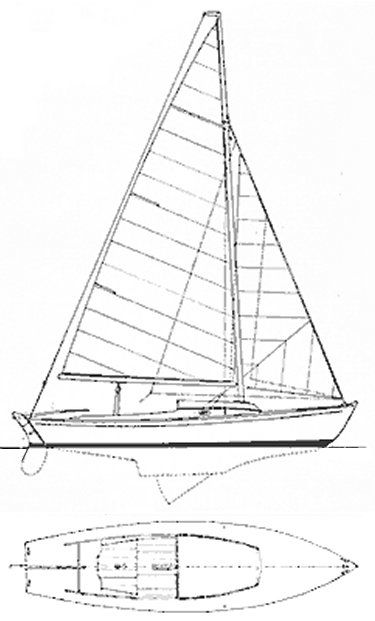The Hansa-Jolle, a distinctive German sailboat, embodies a unique blend of day-sailing vibrancy and modest cruising capability. Conceived in 1947 by the renowned designer Henry Rasmussen of Abeking & Rasmussen, this vessel was initially envisioned as a robust cruising boat, particularly suited for the inland waters and lakes of Germany. While its name, "Jolle," typically refers to a dinghy, the Hansa-Jolle is more accurately described as a keel-centerboarder, featuring a fixed fin and a notable draft, which lends it stability and enhances its sailing characteristics. Over its long production history, which includes a period where Mader Bootswerft produced fiberglass versions from 1977 to 1981, the Hansa-Jolle has earned a reputation as a classic that balances traditional lines with a lively performance, appealing to both recreational sailors and those with competitive aspirations.
Hansa-Jolle Information, Review, Specs

- Make
- Model
- Number Built
- Production Year(s)
- 1947 - ??
History and Design
The genesis of the Hansa-Jolle dates back to 1947, emerging from the design pen of Henry Rasmussen, the founder of the prestigious Abeking & Rasmussen shipyard. Rasmussen's design was a response to the post-war allied restrictions on the construction of larger boats, leading him to create a smaller, yet capable cruising vessel. From its inception, the Hansa-Jolle was designed as a "Fahrtenschiff," or touring boat, intended for leisurely voyages.
Initially constructed in wood, the Hansa-Jolle maintained its traditional appeal for decades. A significant evolution occurred in 1977 with the introduction of a fiberglass version, with Mader Bootswerft undertaking its construction from 1977 to 1981. Mader, a builder known for its embrace of modern composite materials and advanced construction techniques, applied its expertise, which typically favored lightweight, robust, and high-performance racing yachts, to these fiberglass iterations. This transition allowed the Hansa-Jolle to continue its legacy with the benefits of contemporary materials while retaining its classic lines. The model's enduring design has seen it evolve from purely a cruising boat to one capable of competitive regattas.
Sailing Performance and Handling
Measuring just over 19 feet in length overall (19.19 ft) with a waterline length of 15.91 feet, the Hansa-Jolle is a compact and manageable sailboat. Given its modest size, traditional performance ratios commonly applied to larger yachts are less relevant. Instead, its design emphasizes a harmonious blend of the spirited handling often associated with a dinghy and the stable, predictable motion of a small yacht.
As a keel-centerboarder with a minimum draft of 1.64 ft and a maximum draft of 3.28 ft when the centerboard is deployed, it offers both shallow-water accessibility and improved upwind performance. Owners and enthusiasts often describe the Hansa-Jolle as a lively boat, responsive to the helm, and well-suited for sailing on the diverse inland waterways and lakes of Germany, such as the Bavarian lakes, Lake Constance, and Dümmer Lake Steinhude. Its fractional sloop rig contributes to its ease of handling and provides ample sail area for enjoyable performance in various wind conditions.
Accommodations and Layout
Despite its relatively small size, the Hansa-Jolle distinguishes itself by offering practical accommodations that enhance its cruising capabilities. It features a lockable cuddy cabin, providing a sheltered space that can comfortably accommodate two people for overnight stays. This makes it a genuine "pocket cruiser," allowing sailors to extend their outings beyond a single day. While specific details on the interior finish and materials are less documented, the emphasis is on functionality and protection from the elements, rather than extensive luxuries. The cabin layout typically includes basic amenities essential for short-term cruising, allowing sailors to enjoy a degree of comfort and privacy not always found in boats of similar length.
Measurements
Construction & Hull
- Construction Material
- Fiberglass/Wood Composite
- Hull Type
- Monohull Sailboat
- Keel Type
- Centerboard
- Rudder
- 1x —
- Ballast
- 331 lbs
- Displacement
- 1212 lbs
- Water Capacity
- -
- Fuel Capacity
- -
Engine
- Engine Make
- —
- Engine Model
- —
- Engine Type
- —
- Engine HP
- —
- Engine Count
- 1
- Drive Type
- —
- Fuel Type
- —
Rig & Sails
- Rig Type
- Fractional Sloop
- P (Main Luff)
- -
- E (Main Foot)
- -
- I (Foretriangle Height)
- -
- J (Foretriangle Base)
- -
- Forestay Length (est)
- -
- Main Sail Area
- -
- Foretriangle Sail Area
- -
- Total Sail Area (Reported)
- 151 sqft
- Total Sail Area (Calc)
- -
Dimensions
- LOA
- 19.19 ft
- LWL
- 15.91 ft
- Beam
- 5.41 ft
- Draft
- 3.28 ft
- Max Headroom
- -
- Air Draft
- -
Calculations
- Hull Speed
- 5.34 kn
- Pounds per Inch Immersion
- 307.55